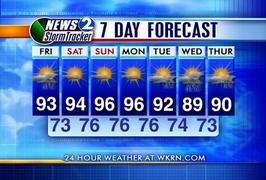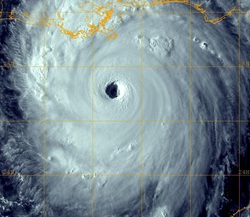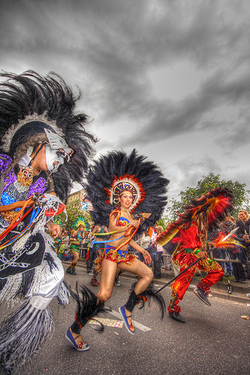How Meteorologists Expect the Weather

When ever we want to know what to wear outside and the temperatures for the week, we simply turn out televisions on and a meteorologist is telling us the weather and temperature. But do you ever wonder how they forecast and expect the weather or do you just take their word for it and hope they know what they are doing? We tend to never really question how they can tell the forecast for the week, we just accept the information is valid.
Meteorologists use different methods upon making their forecasts.
(1) Persistence Method assumes that the conditions at the time of the forecast will not change. As we can see this has many flaws as one day can be bright and sunny and the next can be down pouring with rain.
2)Trends Method determines the speed and direction of movement for fronts, high and low pressure centers, and areas of cloud and possible precipitation. Once this information is gathered, one can prefect where he or she expects those features to be in the future. This is based of the meteorologists expectations so we can see the flaws in this method as well.
3)Climatology Method involves averaging weather statistics accumulated over many years to make the forecast.
4) Analog Method involves examining today's forecast scenario and remembering a day in the past when the weather scenario looked very similar. The forecaster would predict that the weather in this forecast will behave the same as it did in the past.
5) Numerical Weather Prediction uses computers to make a forecast. Complex computer programs run on supercomputers and provide predictions on many atmospheric variables such as temperature, pressure, wind, and rainfall. A forecaster examines how the features predicted by the computer will interact to produce the day's weather.(http://ww2010.atmos.uiuc.edu/(Gh)/guides/mtr/fcst/mth/prst.rxml)
We can see that our forecasts are based on the expectations of meteorologists and many times their expectations are wrong. According to Top Reasons Your Local Forecast is Wrong by Rachelle Oblack, she says “The outlook on a 10 day forecast is so poor, I think I would rather bet on a horse race. At least I know someone will end up the winner!” We look at the forecast for the week and base our schedule around that sometimes and we all know, time and time again we find ourself saying, "Wow! The weather report was way off!" With all the technology meteorologists have acquired, the weather is still unexpected sometimes but we're improving, one day at a time.
Meteorologists use different methods upon making their forecasts.
(1) Persistence Method assumes that the conditions at the time of the forecast will not change. As we can see this has many flaws as one day can be bright and sunny and the next can be down pouring with rain.
2)Trends Method determines the speed and direction of movement for fronts, high and low pressure centers, and areas of cloud and possible precipitation. Once this information is gathered, one can prefect where he or she expects those features to be in the future. This is based of the meteorologists expectations so we can see the flaws in this method as well.
3)Climatology Method involves averaging weather statistics accumulated over many years to make the forecast.
4) Analog Method involves examining today's forecast scenario and remembering a day in the past when the weather scenario looked very similar. The forecaster would predict that the weather in this forecast will behave the same as it did in the past.
5) Numerical Weather Prediction uses computers to make a forecast. Complex computer programs run on supercomputers and provide predictions on many atmospheric variables such as temperature, pressure, wind, and rainfall. A forecaster examines how the features predicted by the computer will interact to produce the day's weather.(http://ww2010.atmos.uiuc.edu/(Gh)/guides/mtr/fcst/mth/prst.rxml)
We can see that our forecasts are based on the expectations of meteorologists and many times their expectations are wrong. According to Top Reasons Your Local Forecast is Wrong by Rachelle Oblack, she says “The outlook on a 10 day forecast is so poor, I think I would rather bet on a horse race. At least I know someone will end up the winner!” We look at the forecast for the week and base our schedule around that sometimes and we all know, time and time again we find ourself saying, "Wow! The weather report was way off!" With all the technology meteorologists have acquired, the weather is still unexpected sometimes but we're improving, one day at a time.
How Meteorologists Didn't Expect Hurricane Katrina

Hurricane Katrina of 2005 was one of the deadliest natural disasters in the world. With devastating losses and destruction, no one will ever forget the tragedy that brought people to unite and help. The storm began in Louisiana in the midst of the night and had its center about 90 miles away of New Orleans in the early morning of August 29th. Katrina was a one of the most deadliest hurricanes with over 1,500 people dead in Louisiana and at least 238 in Mississippi. Katrina was a huge awakening for meteorologists who were not able to predict the hasty change in storm arrangements. The lack of ability to expect a deathly storm frightened many people in ways that made them uncomfortable and scared. Meteorologists began to create new equipment in order to expect all storms in the future hoping to save lives.
Meteorology in History

Before televisions and radio casts, people could not rely on the weather man to let them know if their would be rain for their crops to grow, or if the temperature would increase letting them hunt more to survive. The Greeks and Romans based their entire lives around their Gods seeing how they controlled their faites and destiny. They prayed to Gods like Aeolus, the king of the winds, Anemoi, the Daemones of the violent storm- winds, and Chione, the goddess of snow. Endless prays and sacrifices were done hoping to please the gods and goddesses expecting good karma in return. Native Americans used a ceremonial dance called the Rain Dance Both men and women participated in these ceremonies where they would pray to the rain gods for rain especially during long droughts. Only relying on their own predictions and what they are able to expect, future weather became a mystery.
For More Information:
Hurricane Katrina Taught Meteorologists a Lesson: http://www.metrolic.com/hurricane-katrina-taught-meteorologists-a-lesson-121026/
Meteorologist: http://ww2010.atmos.uiuc.edu/(Gh)/guides/mtr/fcst/mth/prst.rxml
Meteorologist: http://ww2010.atmos.uiuc.edu/(Gh)/guides/mtr/fcst/mth/prst.rxml
